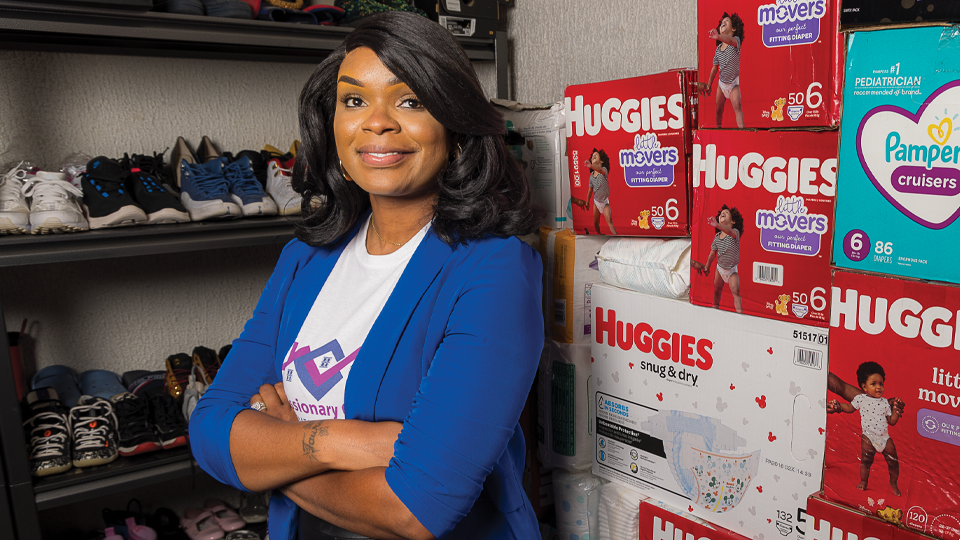
Jessica Currie’s nonprofit delivers essentials to families in need.
EDITOR’S NOTE — This story includes discussion of suicide. If you or someone you know needs help, call or text 988 to reach the national suicide and crisis lifeline. There is also an online chat at 988lifeline.org. Current MATC students can seek help through Counseling and Psychological Services by emailing counseling@matc.edu. Employees who need support may contact MATC’s employee assistance program by calling 1-800-236-3231.
For Jessica Currie, director of a nonprofit helping mothers in crisis, success started at MATC’s Adult High School
Without a home, without any support, without a proper education, and seemingly without a future, Jessica Currie hit rock bottom. At 19, she was a mother of two children, a high school dropout, broke, hungry and sleeping in her car. “I thought about suicide,” she admitted. “I cried in my car, not knowing how I was going to continue.” Instead of taking her own life, Currie reclaimed it. She persuaded a kind-hearted landlord to rent her an apartment. She received assistance at a local YWCA, and she decided to go to MATC to get her high school diploma. “I needed to do this because I knew I wasn’t going to go far in life without a high school diploma,” she said.
She enrolled in MATC’s Adult High School program, which offers individuals 16 and older the chance to earn a high school diploma in a classroom setting. The program provides a full range of academic and student support services, and many course incorporate hands-on learning. That’s exactly what Currie wanted. “The GED (General Educational Development) program didn’t really work for me,” she said. “There were too many tests. I needed that one-on-one experience where I could talk to teachers and ask for help if I needed it.”
MATC’s Adult High School is a fully accredited high school; the diplomas students earn are high school diplomas, not equivalents that employers might reject, said instructor Elaine Hines, who has worked at the college’s Adult High School since 2001. The program delivers a traditional high school educational experience to non-traditional students. Students with no previous high school experience must complete 46 credits of coursework to earn their diploma, Hines said. They must take at least six credits during the program, which is split into four eight-week quarters. “Almost every student we have has started high school and never finished,” Hines said. “That happens for all sorts of reasons.
Things happen in life. We have seen students here ranging from their 20s to their 80s.”Currie attended Milwaukee Public Schools’ Washington High School for one year while living with her mostly absent godmother. “She just left me alone. She was hardly ever around. So, I just decided I didn’t need to go to school,” Currie recalled. “I started hanging with the wrong people.” Soon, she was pregnant and homeless. “I was in survival mode. I went from house to house, from couch to couch,” she said.
By the time she started adult high school classes, Currie had three children and was working from 6 a.m. to 2:30 p.m. every day. She attended classes from 4 to 6 p.m. Currie earned her diploma and went on to receive a certificate in nonprofit management from the University of Wisconsin-Parkside.
Today, she is a wife, a mother of six, a motivational speaker, an author, and founder and executive director of Missionary Currie for Women and Children, a nonprofit dedicated to assisting underserved and unhoused women and children in Milwaukee and Racine. In the spring of 2024, she ran for a seat on the Milwaukee Common Council.
“Attending adult high school was the best thing I have ever done,” Currie said. “I am so happy I found out about it when I was 19 and not when I was 39 or 49. With a high school diploma, I had so many more opportunities. Everything I have done I would have not been able to do without a diploma.” ■
Learn more about Jessica Currie’s work at missionarycurrieinc.org.
